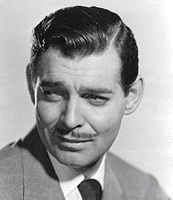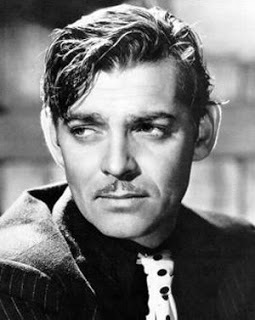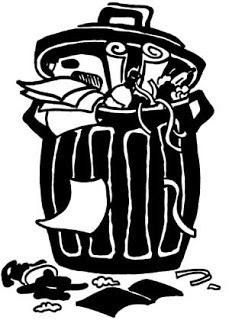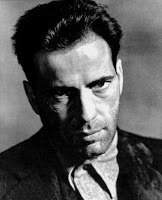B.R. Stateham's Blog, page 28
May 7, 2011
Meet Frank Morales
 Meet Frank Morales. The other half of the Turner Hahn/Frank Morales homicide detective team.
Meet Frank Morales. The other half of the Turner Hahn/Frank Morales homicide detective team.Yeah, I know. I know . . .
With Turner I had a photo of Clark Gable--the spitting image of Turner. With a few modifications. But with Frank I have this. A rendition of a description of Frank. Not quite the same thing. Not nearly as impressive.
But there's a reason for that, boyo.
I can't think of anyone famous, or near famous, who comes even close to representing Frank. Frank is, without a doubt, just fraken . . . . different.
I mean, c'mon. The guy is a carrot topped lookalike Neanderthal wannabe. He's got small, little piggy eyes and a jaw that looks like it's made out of hand chiseled granite. And no neck. Apparently there's a head--and a set of shoulders. How he turns his head and looks to his left and right is a mystery to everyone. But he does. The most curious thing about him is his intellect. Whereas mere mortals around him sport a three digit IO, Frank may have one that has four digits. No kidding. He seemingly knows everything and can recall everything.
No. He's no super hero. He makes mistakes. He opens his smart-ass mouth enough times to get people pissed off at him. Often. He's married to a drop-dead gorgeous Italian who has a temper that, when it blows, rivals that of Mount Vesuvius. And four kids. And dogs. And cats. And a parrot. So . . . . no. He's not a super hero. Just a very, very interesting character.
Remember what I said that, as a writer, if you develop interesting characters that have a width and depth about them they will be the ones that keep a reader interested in your writing. What?! I didn't mention that in an earlier post? 'Sumbitch!
It's true, Pookie. Bank on it.
Readers can be fickle. Choosey. Even down right mean. But they also can be loyal. Loyal to the point of being certifiably nutty. Give'em someone than can identify with--that they can admire and even fall in love with--and they'll come back to you over and over and over. Come back even though eventually (and it happens to all successful writers--and not so successful writers) the interesting story plots have dried up and blown away. They'll still come back.
Now how you get the reading public to discover your interesting characters is a whole new can of worms we should discuss. And we will. Just as soon as I figure that out for myself. So stay tuned.
Published on May 07, 2011 10:25
May 6, 2011
Meet Turner Hahn
 So you're going to write a novel, mon ami! Swell! Groovy! What's it about, hon?
So you're going to write a novel, mon ami! Swell! Groovy! What's it about, hon?I wrote a novel. Called it Murderous Passions. About two homicide detectives named Turner Hahn and Frank Morales working on four separate and unrelated homicide cases. A case of 'whodunit' overkill for those who are fans of the mystery/detective genre.
Okay. You write a novel about homicide detectives you need to create a visual image--make an in depth character study--of them. Make the character(s) strong enough, interesting enough, and the book has a strong chance of actually being read by someone. In Murderous Passions there are two main characters. Equals. Not the traditional main character with a tagalong lap dog following around repeating like a dull echo everything the main character says. I wanted to write a complex novel. Among other things, I wanted to create a 'buddy' novel. Show that it was possible two equally intelligent, tough, interesting mugs could occupy the same space at the same time. I think I succeeded.
The mugshot above is the spitting image of one of the main characters. Turner Hahn. Yeah, you guessed it. The photo is Clark Gable--the 30's matinee idol of moviedom. One tough, hard nosed, but likeable main leads in filmland to come down the pike. I wanted to paint a mental image in the reader's mind what Turner Hahn looks like. Clark Gable fits the bill.
Turner is bigger. Stronger. Has a thicker neck and a thicker mustache. But there's that same dark hair. That same smirk like Gable's. That same smart-ass attitude that marked all of Gable's roles. I'll be honest with you, pilgrim. One of the other reasons why I wanted to write a novel, and hopefully an entire series, about two tough, hard headed, smart-ass good guys is because I think we've seen the venerable ol'genre of the mystery/detective turn into a cheering section for the anti-hero.
The bad guys and/or 'I really don't know what they are!' anti-hero is winning out.
Not good, me bucko. Not good at all.
I think all of us need our heroes. We need stalwart figures to stand up in literature and hold back the gathering hordes of those who prosper in chaos and mayhem. That's Turner Hahn. Big. Mean when he has to be. Gentle when he has to be. A forever smart-ass; but as intelligent as they come. A working blue collar cop who came off a piss-poor farm in Missouri and left it forever when he got a football scholarship to a major university. Married once; but divorced. Likes women but has a hard time keeping one around for long. And rich. Yeah, buddy; I said the guy is rich.
One day a lawyer shows up at the precinct house and tells him a grandmother he thought was long dead left him a sizeable inheritance. So overnight he goes from being a cop who lives from paycheck to paycheck more or less like the rest of us--suddenly finds himself wallowing in an ocean of money.
Yet he remains a cop. Still keeps his detective's badge and goes to work every day.
The second book of the series is coming out soon. Called A Taste of Old Revenge. It fills out the character sails of Turner's past and makes him a more complete man. And you get to meet Turner's grand father. That in itself is one interesting experience. With luck the novel will come out in e-book form in June.
If you've read any of the many short stories I have out featuring Turner and Frank, you'll get a feel of the men. And I'm hoping you'll like'em. I think they'll remind you of the classic noir/hardboiled main honchos of the past--but discover they are uniquely different as well. So go hunt up one of their stories, or the novel, and sit down and read it. You won't be disappointed.
Now that you've met Turner there is the other half of the duo to know.
Tomorrow I'm going to talk about Turner's partner; Frank Morales. So come back and let's do this again.
Published on May 06, 2011 07:36
May 5, 2011
Writing in a Fit of Depression
 Depression sets in. The stark reality of knowing the grim truth.
Depression sets in. The stark reality of knowing the grim truth.Buddy, you're just another cog in a machine containing billions of cogs. You write noir/hardboiled. Others write noir/hardboiled. Millions of'em. Maybe billions. And they're all like you, Pookie. Like you, they think they're the greatest thing since sliced-bread. Chocolate covering caramel. A cold glass of beer on a hot summer's day.
Isn't it true? If you're a writer you have to believe, deep down, that you're the best damn writer to come along since Raymond Chandler or John D. McDonald. If you don't have that kind of ego, darlin', you're not going to last long. Like leaves on the trees of summer, if you don't have that belief in yourself you're going to dry up and blow away when winter comes.
And, brother, winter comes often in the writing game.
The competition to be seen and recognized is a set of odds stacked up to be phenomenally against you. You soon realize that it's not talent that wins out in this business. It's luck. Mindless, random, stupid . . . luck.
And when you finally come to this conclusion, that's when the depression sets in. A morass of black fuming invectives and deep pits of bubbling anger barely kept in check. Or not kept in check, depending on how strong you are in controlling your emotions. A sense of pointlessness overwhelms you. You keep asking yourself over and over again, "Why keep doing this shit? Why beat myself up on something that no one . . NO ONE . . . is ever going to read?"
Welcome, brother or sister, to the Brotherhood of The Writer. You are now a charter member.
So how do you get out of the slime pit of pitying yourself? How do you shake off the depression and get back to an even keel? What's the secret, Merlin, in finding the light again? The Answer?
From within yourself.
Nothing external is going to help you. It's got to come from inside your creative soul to pull you out of your doldrums. It's a far easier effort if you have a well-developed, warped sense of humor. Humor . . . laughter . . . may be the greatest penicillin for depression ever invented. If you can laugh at yourself, first and foremost, and then at the world in general--well then, you're going to be okay. Yeah, there will be bad days. But with that sense of humor of yours, you're gonna get through it.
But what if you haven't got a humorous bone in your body? What then, Pookie?
Ask yourself two questions: And answer them with brutal honesty.
1. Do you write because, deep down, you want to be rich and famous?
or,
2. Do you write because there are stories in you . . . characters in you . . . who demand to be heard.
The answer to getting over your depression rests in which question is your driving force for the writing you do. So, I guess, I can't help you anymore. I wish I could offer more suggestions. But I can't. You have to decide for yourself.
Good luck, kid. I'm pulling for you.
Published on May 05, 2011 08:41
May 4, 2011
Bummer
 Bummer.
Bummer.You sit down and start to write a short story. Or a novel. Or a movie script. You slave over the keyboard. You bleed all over your computer screen. You litter the keyboard with cake crumbs and spill coffee . . . or bourbon . . . or Coke . . . everywhere.
It's a fraken war. It's like dragging a nine hundred pound gorilla through the front door of a baby's doll house.
Okay, Pookie. Time's up. Time to throw that piece of shit out and start over.
No--I'm not kidding. It's time to go.
Let's face it, the real artist in you isn't too thrilled about what you're writing. In fact it thinks it's . . . well . . . . literately a piece of shit. So why fight it? The real artist in you knows what's good for you.
The real artist is the subconscious. Your subconscious. That strange old man who lives in the basement and is never seen when the sun's out. Day in/day out he's down there pounding away on the keys writing something. And you--the fresh faced, pimple-assed young kid living up on the top floor (the conscious, bucko!) damn well better listen to the Ole' Man. And nine times out of ten you do and don't even know it. When the story flows like the biblical Honey of Plenty, when your fingers fly over the keys and the story just rolls out, that's when you and the Ole' Man are on the same page.
But when the story declares war on you and won't take any prisoners--nor expect to be taken prisoner-- well then, Pookie; you know now what to do. It's the Ole' Man is talking to you.
Want my advice?
Listen to the Ole' Man. He'll save you hours upon hours of useless rewrites. And a few gray hairs.
Published on May 04, 2011 12:20
May 2, 2011
Writing the short story

Writing the short story. How do you do it?
Got a theory/idea on what constitutes a great short story?
Yes . . . and no, baby. I do and I don't. For the last 18 months I've been writing a lot of short stories. Playing with them. Slicing and dicing and trying to come up with a form that moves with a smooth flow; like drinking the first glass of Coke Cola of the day (my preferred drink). Kinda goes down the throat with a hot kick and a squirming growl--but tastes soooooooooo good doing it!
What I've come up with is this. First, I like innuendo in telling a story instead of throwing a brick through a store front window. What you imply in the story is as important as saying something. Critically so--since it gives the reader the luxury of allowing his imagination to build all kinds of mental images and implications around the main story.
Secondly, Raymond Chandler had it right: brevity in dialogue. Short, vicious body punches straight to the gut when it comes to dialogue. Crisp, tight dialogue--and not too much of it--is the icing on the cake. It offers the best vehicle for you to spring that surpise ending. Or tug the emotional strings of the heart in a profound way.
Thirdly--and possibly controversially--leave a few holes in the plot. Yes, the plot has to make sense. If the plot isn't laid down into a believable carpet, everything else falls to pieces. But it's not important to explain every detail. Again, it goes back to the Number One thingee--the implications. Half the joy for a reader, I think, is figuring out how the crime/hit/love note/whatever . . . was actually done/created.
Fourthly--one sentence descriptions. Vivid descriptions to describe scene settings, people, actions. In one sentence (not one sentence for all! One sentence for each item). Absolutely, absolutely, absolutely critical.
There. That's it. The Perfect Short Story!!
Or is it?
You tell me.
Published on May 02, 2011 08:56
April 30, 2011
Vincent Zandri has sold 100,000 ebooks in 60 days.That's ...

Vincent Zandri has sold 100,000 ebooks in 60 days.
That's 100 THOUSAND books in sixty days.
Sumbitch, brother!
Now Vincent works his ass off promoting his books. There's no question about it. And I stand in absolute admiration at both his efforts and successes (and maybe a little jealousy as well?). But interestingly, in his blog, he mentions that his publisher, Stonegate Publishing , had the right juju in selling ebooks--apparently more so than other ebook publishers.
So that got me to thinking. How does one indie publisher absolutely excel at selling their books and promoting their authors, while others just shuffle along and seemingly only go through the motions of selling books? I mean you have some indie publishers simply beating the bejesus out of their competition. Other publishers in the ebook business just tread water.
Take Untreed Reads , for instance. A San Francisco publishing house that does only ebooks. They are one of those 'beat the bejesus out of the others' kind of houses I mentioned. They offer their books in a plethora of different bookselling sites around the world. And they are successful. Very successful. (a publishing house soon to bring out one of my Turner Hahn/Frank Morales novels, by the way)
How?
Don't all ebook publishers jump into the same swimming pool more or less wearing the same bathing suit? Each one has the tools in front of them to succeed or fail. Yet so few seem to really succeed while hundreds of start-up ebook publishers flash into existence for a year or two and then fade away.
Trestle Press is a new company. It's head honcho is a guy by the name of Giovanni Gelati. Full of piss and vinegar (and Gino, if you're reading this--that's a compliment). Has a thousand ideas about publishing. Asked me to submit a lot of my stuff--and be damn if it wasn't up and on Amazon in a matter of days. I'm excited to be one of his early writer/authors. I've got a feeling Trestle Press is going to be a stellar performer.
Let's hope so. I'm busting my ass trying to write the material he wants. His success is my success. And yes, brother, it's about damn time I should see some success in this gig.
It's been a long time coming.
Published on April 30, 2011 08:03
April 27, 2011
Evil Wins Out

Question: Why do noir/hardboiled readers prefer the bad guy over the good guy?
I pick up on this more and more. The more I write about 'Smitty,' my black-eyed, coldly efficient killer, the more people say they love reading about him. He's not just a killer. He's not just one deminsional in nature. There's some twists and turns in his persona that you necessarily wouldn't expect.
On the other hand, I have two characters who are the good guys. Turner Hahn and Frank Morales. Homicide detectives. As tough as anyone out there. Smarter than most. They too have their personality quirks which sets them apart from smiliar characters found in the genre. And they have their fans, to be sure.
But, sadly--and quite curiously--not nearly like the fans for Smitty.
So what's going on here? Why do fans root for the bad guy more so than the good guy? What kind of deep psycho-babble is going on here? Do we really prefer our bad buys to win out? Does that say something about all of us; that maybe . . . just maybe . . . all of us want to get down and dirty with the world around us and get away way with it?
To play honest and fair in a world not so honest and fair, takes significantly more strength, as well as restraint, than being dishonest. You would think Turner and Frank would be more admired for getting down and dirty sometimes in solving their cases. But nope. So far the pendulum swings the other way.
We much prefer seeing Smitty use his switch-blade on someone. Or plug someone between the eyes with a silenced .22 caliber Ruger. Or use enough plastique explosives to take out a Caddy filled with mobsters. Do the hit with no regrets. No bad feelings. No hesitations.
And ask for more.
Which, I'll admit, in the end is okay by me.[image error]
Published on April 27, 2011 18:29
April 26, 2011
A few 'suggestions' when it comes to writing hardboiled

Yesterday a good friend, Joyce Juzwik, wrote a guest blog in here concerning the ten 'rules' a writer had to observe in order to write hardboiled or noir fiction. If you read the blog you had to notice Joyce had some clear objections to the rules. I did too.
Hard clad 'rules' are always made to be broken. Along comes that unusually gifted and talented writer, and 'rules' go out the window. I, for one, would never be so presumptious as to set down a set of rules for writers to follow. One reason being that, hey . . . how many readers have heard of my illustrious name? (answer--maybe my wife; a couple of good friends. And bill collectors. That's it, buddy!)
But if I may, let me offer a few 'suggestions.'
One: Don't be afraid to write. Write every day. Experiment. Play with words. Make a fool of yourself. Sooner or later it'll start to make sense. To click. And voila! You've found a style you can call all your own.
Two:Related to the above somewhat, don't be afraid to out-and-out copy the masters. You gotta start somewhere, so starting out writing a story that sounds like Earl Derr Biggers (the creator of Charlie Chan)or any writer you admire,
can't be all bad. Just remember, though--the goal is not to become a second Earl Derr Biggers but to begin the process of finding your own road to travel down.
Three:Make the opening chapter, the opening two pages, absolutely mind-boggling. The goal is to capture the reader's interest and never let'em go. Do it immediately. And keep building on it all the way to the end.
Four: Yes indeedy--introduce the killer(s) as early as you can in the story. But disguise them. Throw them into a gaggle of other geese who, each one of them, have just as much a reason to be the bad guy as the next schmuck.
Five: Don't be afraid of sub plots. Sub plots that doesn't necessarily have anything to do with the main plot. But make them key on some trait of the hero/bad guy. Making the hero/bad guy more of a complex character helps keep the reader's interest keyed up. Subplots are built for that.
Six: Pay attention to dialogue. Make it sound as real as possible. But for god's sakes . . don're rely on dialogue to carry the entire novel down the road without other foils to help out. A novel with nothing but dialogue is about as worthless as an empty beer keg. And just as depressing.
Seven: If you're thinking about writing a series (and aren't we all?) pay attention in writing the last chapter. The last few pages. Wrap up the action--but don't make it 'final,' if you get my drift.
Eight:Finally, whenever you find someone who wants to give you a set of rules on how to write, turn around and run like hell in the OPPOSITE direction. Following'rules' is the best way in the world to stiffle creativity. Hell, we have lit agents and book reviewers for that task. Let's not deprive them of their miserly little pleasures in life.
Hey! Are you running yet? No? Why the hell not?!
Published on April 26, 2011 09:04
April 25, 2011
Joyce Juzwik is a good friend of mine. A fellow writer w...

Joyce Juzwik is a good friend of mine. A fellow writer who dabbles, often and with huge amounts of talent, into the fine art of the macabre. Bloody tales of the strange and twisted. She is a good friend. But her writing is . . . well . . . devoted to those who love to read about bad people doing bloody deeds.
Just the kind of writer I like.
She was gracious enough to accept a guest-blogging role here today. And she came up with some interesting rules about writing in the mystery genre. See if you agree with them. Or disagree.
DO YOU FOLLOW THE RULES WHEN YOU WRITE CRIME FICTION/NOIR?
During my travels through various writing sites, I noticed several of them mentioned rules that should be followed whenever writing a crime fiction/noir novel. While there were minor differences in phraseology, the supposed 'rules' were pretty consistent. Let's explore each of these.
1. Whoever your killer is, make sure you let your readers meet him or her early on. You don't want them to pop up out of nowhere late in the story.
I'm not certain I even understand this. Generally speaking, with crime fiction, there is an element of mystery involved. Are they saying you should reveal the identity of your killer as 'the' killer or just allow the reader to get to know the character early on, but not let on what he or she has done or is planning to do? Since I'm not clear on what this actually means, I'm also not clear on how this is to be accomplished.
2. At least one murder should occur within the first three chapters.
Here I totally agree. When I'm reading a crime novel, if the bodies aren't piling up by the end of Chapter 3, I'm done with it. At the risk of sounding psychotic here, if your novel includes one or more murders, I do feel the first one, at a minimum, should occur fairly early on. Locales, characters, basic storyline, all critical elements, but it comes down to the crime after all. Right?
3. Don't include offensive crimes.
Regarding this rule, mention was made of the subjects of rape, child molestation and cruelty of animals being strictly taboo. While I cannot agree that any subject should be regarded as forbidden, I will agree that there are some that require handling in a tactful and sensitive manner. If any of these types of occurrences are relevant to the storyline, they should be included. However, make sure they are relevant. Don't add these, or any other form of cruelty simply for shock value. That's the lazy way out and requires no writing talent of any kind.
4. The crime has to be believable.
What? I'm not sure where this came from. It's a sad state of affairs, but in the world today, unfortunately, there aren't a lot of limits to what people will do to each other. Perhaps it refers to not including anything supernatural or a comic book type of crime, whatever that may be. I could use some clarification here.
5. Research when necessary.
Now on this one, I agree 200%. Whether it concerns a particular location you are using or your weapon of choice, make sure you incorporate accurate information. If the city in your novel is fictional, go wild with your street names, businesses and what have you. But if your city is an existing one, you'd better make sure your directions from such and such restaurant to so and so hotel in the downtown area are perfect. You never know. One of your readers might have been born right down the street from there. Even if none of your readers have ever been near your city of choice, if you don't know what you're talking about, somehow it shows. I can't explain it, but as a reader, I don't have to be an expert in any particular field to know when the writer's been too lazy to look at a map. The same goes for weapons and especially areas of science. With documentaries on every night of the week discussing DNA and ballistics, inaccuracies will be spotted in a heartbeat. Nothing will turn a reader off a writer quicker than that. Make up your characters, make up your plot, but the things you take from the real world, make sure you keep them real.
6. Don't reveal the identity of your killer too soon.
I'm not sure, but doesn't this sort of contradict Item #1? Regardless, I'm not sure this should be a hard and fast rule. I mean, remember my favorite detective, Columbo? You knew within the first five minutes of the show who the killer was, but how their guilt was discovered was the point of the show. The motivation was sometimes revealed at the onset or fully explained at the end, but the killer's identity was never in question. I don't see any reason why this wouldn't be workable in a novel, but it would require careful planning and appropriate presentation.
7. The killer must be capable of the crime.
I don't believe this refers specifically to the criminal being physically up to whatever activity you have planned. I believe this may refer to him or her being psychologically and/or emotionally capable of committing a particular crime. While we can choose to make any of our characters break the law, before we choose the crime they are to commit, we need to examine who we've created. What kind of person is this? What are their likes and dislikes? What are their fears? For instance, if you've included something about a character's childhood where they were traumatically scarred by being locked in a dark closet, don't have them waiting for their victim in a pitch-black alley. I know that's an oversimplification, but I hope you see what I'm getting at. We shouldn't have our character who's terrified of fire commit an arson, or if we have one who knows they're a bleeder get involved in a knife fight and risk being injured in the struggle. Makes no sense. Make sure the crime fits the criminal and vice versa.
8. Start the action early on and keep it going strong.
Here, I agree to a point. While I will admit there is nothing more tedious than reading 10 or 15 pages of thoughts, there is also something very annoying about reading page after page of chases and fights, without really understanding the individuals involved in these confrontations and the motivations for them. I don't need to know the details of every second of every day of a character's life, but I do need backstory on how they came to end up where they are at the point the story takes place. I need to know who they have relationships with, what those relationships are like, how other characters fit into their lives and so on. Without well-defined characters, the plot is useless. Just be careful not to go overboard. A chase or fight here and there keeps me turning the pages.
9. Don't make your good guy the villain.
All I have to say to this is why not? Isn't that half the fun, having someone who is trusted and seemingly on the side of right and justice turn out to be evil incarnate? I believe that kind of twist adds a lot of flavor to a story. This individual appears supportive and sympathetic to the survivors or victim's families, totally cooperative with law enforcement, but behind the mask? Only the victims see what's really there and that's right before they die. How exciting a storyline that would make.
10. Introduce your crime solver early on.
Lastly, again, why? Referring to TV shows again, take Murder, She Wrote. You knew crime writer, Jessica Fletcher, was going to solve the crime. With Columbo, you knew he was going to catch the guilty party. This works out fine if your central character is a particular detective or PI, and the story is geared around this specific individual. Then again, there are occasions where a character who has no connection whatsoever with the police or any such area either witnesses a crime or ends up being falsely accused of one and solves it to clear their name. A scenario like that can work very well and I think would pull the reader in nicely as well, since it would involve a 'regular' person on the trail of a killer. Imagine the danger they'd be in and the tremendous risks they'd be taking because they wouldn't have any real resources available to them. The reader could imagine themselves in that situation and think, now, what would I do, or how would I handle that? It certainly would hold their interest.
Okay. We've gone through all the so-called 'rules' for writing crime fiction. I've told you how I feel about them. What about you? Are you naughty or nice? Do you follow these rules or break them every chance you get? Do you feel there should even be rules like these or any others? I believe the word 'rules' shouldn't even come into play here. 'Helpful guidelines' maybe, but never 'rules'. When our minds create, there shouldn't be any restrictions or limitations on what we imagine. Now, THAT would be a real crime!
BIO: J.F. Juzwik has had a crime fiction novel and a six-part children's fantasy series published by DiskUsPublishing and a horror short included in the anthology Deathgrip: The Legacy, published by Hellbound Books. Her crime fiction/noir stories have appeared in A Twist of Noir, Powder Burn Flash, and Crooked. She blogs about writing crime and horror, and her blog also contains numerous flash pieces and the occasional review.
jfjuzwik.blogspot.com
jfjuzwik.webs.com
diskuspublishing.com/jfjuzwik.html
Published on April 25, 2011 09:58
April 23, 2011
Question: How do you create a character who is as ice-col...

Question: How do you create a character who is as ice-cold as a cadaver when it comes to killing someone--yet one who actually posseses a conscience?
Or put it another way, in a sea of hit-men/assassin killer types found floating around face down in the dark waters called hardboiled, how do you create a character who is different. Different--unique--sympathetic.
A challenge. And that's putting it mildly. But one I wanted to try out one day on a kind of a spur-of-the-moment writing exercise. And . . . I'll be go to hell . . .what popped up on the screen was a guy named Smitty. Fully developed. Mean as back alley Wolverine with an aching tooth--with the black eyes of a pit viper who took in everything and anything in one glance. Reticent in speech--yet rather eloquent in his reticence.
One mean sonofabitch. That's Smitty. Yet . . .
Read the stories closely and you discover Smitty only takes out those justly deserving to be taken out. He's like the grim Angel of Death coming to collect his due among the miscreants and sadistic. And he does it spectacularly. Guns, poisons, explosives--even the front end of an F-150 Ford truck. It doesn't matter. When Smitty sets his eyes on you as his next prey--buddy, you're as good as dead.
Ah. But now, how to make him sympathetic? Make him someone from the dark side who you wind up willingly . . . or unwillingly . . . rooting for? Therein lies the McGuffin, as Alfred Hitchock used to say concerning his films. There's the catch that hooks the reader. And the answer is; I haven't a fraken' clue. It just happened.
One day Smitty was born in the back of my subconscious. He came out like some god of Greek mythology; sprung from the sea fully formed and magnificent to behold. But a god clearly hailing form the shadowy lands of Hades.
Take him for what he is, kid. The guy really does get under your skin and makes you want to read more about him.
Published on April 23, 2011 07:59



